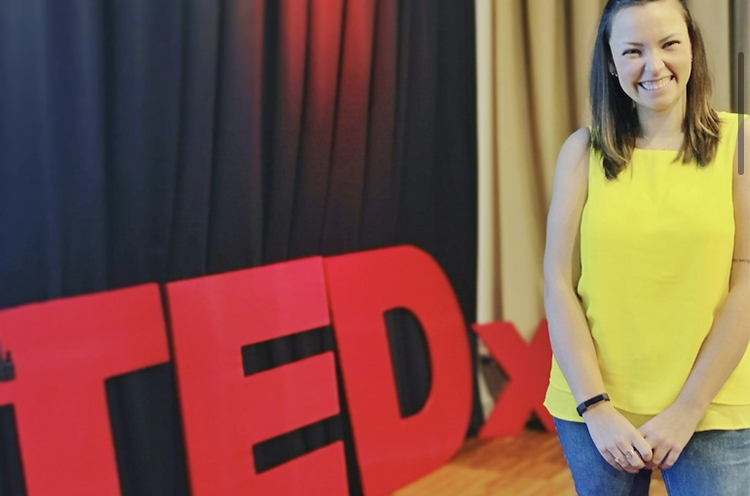It took me six months to share this picture.
Earlier this year, I pitched a 5-minute talk to be one of the speakers in the first ever edition of#TEDxTilburg. I talked about overachievement, fear and shame, how they are fostered in our world and workplaces, and how they led to my burnout.
I didn’t use tactics like teasing the judges with just a fraction of the content. I didn’t try to convince anyone that I was an amazing speaker, or that my talk would change people’s lives.
I just talked about my own shame, my own burnout, while offering hope.
But I was terrified.
As I stepped on the stage, I got severe PTSD symptoms from when I organised events and spoke at conferences in my old job. I zoned out during my talk, and I can’t even remember what I said. I spoke for several years to audiences of dozens or hundreds, back in Brazil, about digital marketing and social media. But I had never given a talk in English, or in the Netherlands. And I had never spoken in public about my own darkness.
When I got back home, I nearly had a panic attack. I was bedridden for weeks after that, and I questioned everything I had done so far with #thebetterachiever. How would I talk about moving past burnout when I clearly wasn’t equipped to deal with it? Was overachievement something we can really recover from? After we burn out, are we ever capable of showing up for any significant challenge without falling apart?
A couple of weeks later, I received a message from one of the organisers of the event, saying my talk had impacted him profoundly and he was grateful for that.
A lot of things had happened since then, and I’ve encountered several setbacks that made me question my voice, my capacity, my potential and even my story.
I wish I could say that now I am feeling wonderful, that I learned to rise above everything, and that fear, shame, anxiety, depression, trauma and burnout are behind me.
But they’re not. Because they’re part of me.
On the days that followed my pitch talk, I realised that I was again chasing perfection. I was naming it differently, but I started believing that to be a#BetterAchiever was this ideal state to which I had to change what I was. I had to let go of all the fear and remove all of my limiting behaviours. I’d face the challenges with a smile on my face. I’d be always driven by my values. And that would lead me to living this bright, positive, organised, creative, purposeful life, surrounded by amazing people.
Now I get it –I think.
Being a Better Achiever means being a little fucked up. It means not following through all my plans. It means starting something really great and then forgetting about it altogether. It means not sleeping well sometimes. It means saying too much yes and too little no. It means feeling exhausted. It means being afraid. It means falling.
What’s different, I suppose, is the day after. Is the picking up the pieces. Is the sitting to meditate after two months of not practising it. Is the writing again after weeks of laziness. It can be the taking a shower and feeling energised to clean the house or attend a meeting that day. Is the coming back up. Checking in. Being kind to myself.
It is to know my way home. To know that no matter how far I divert from it (and I will), I can always come back.
And that seems enough for now.











Este post tem um comentário
Pingback: Salsichas, jabutis e a nossa necessidade de validação externa | Carol Milters